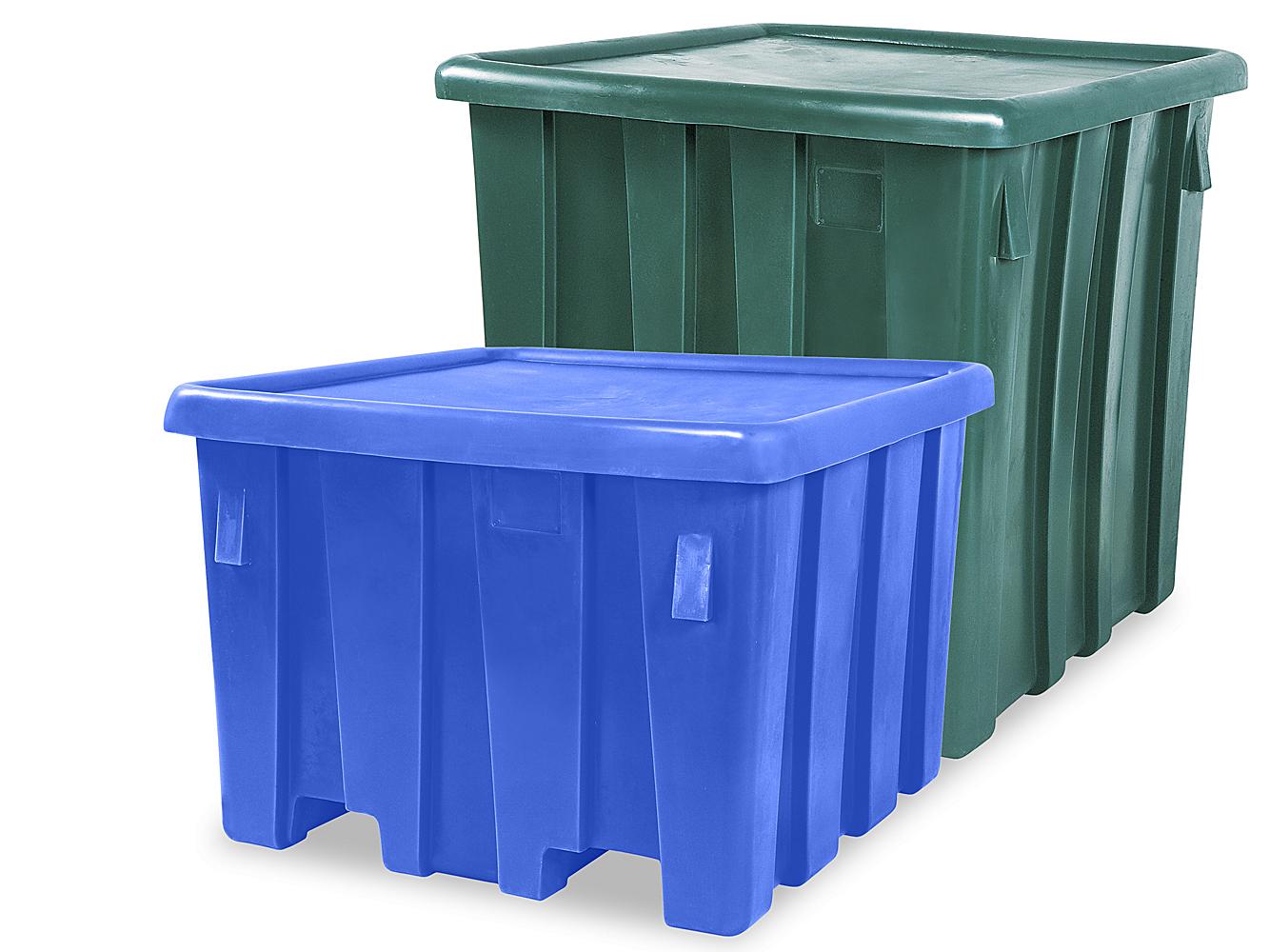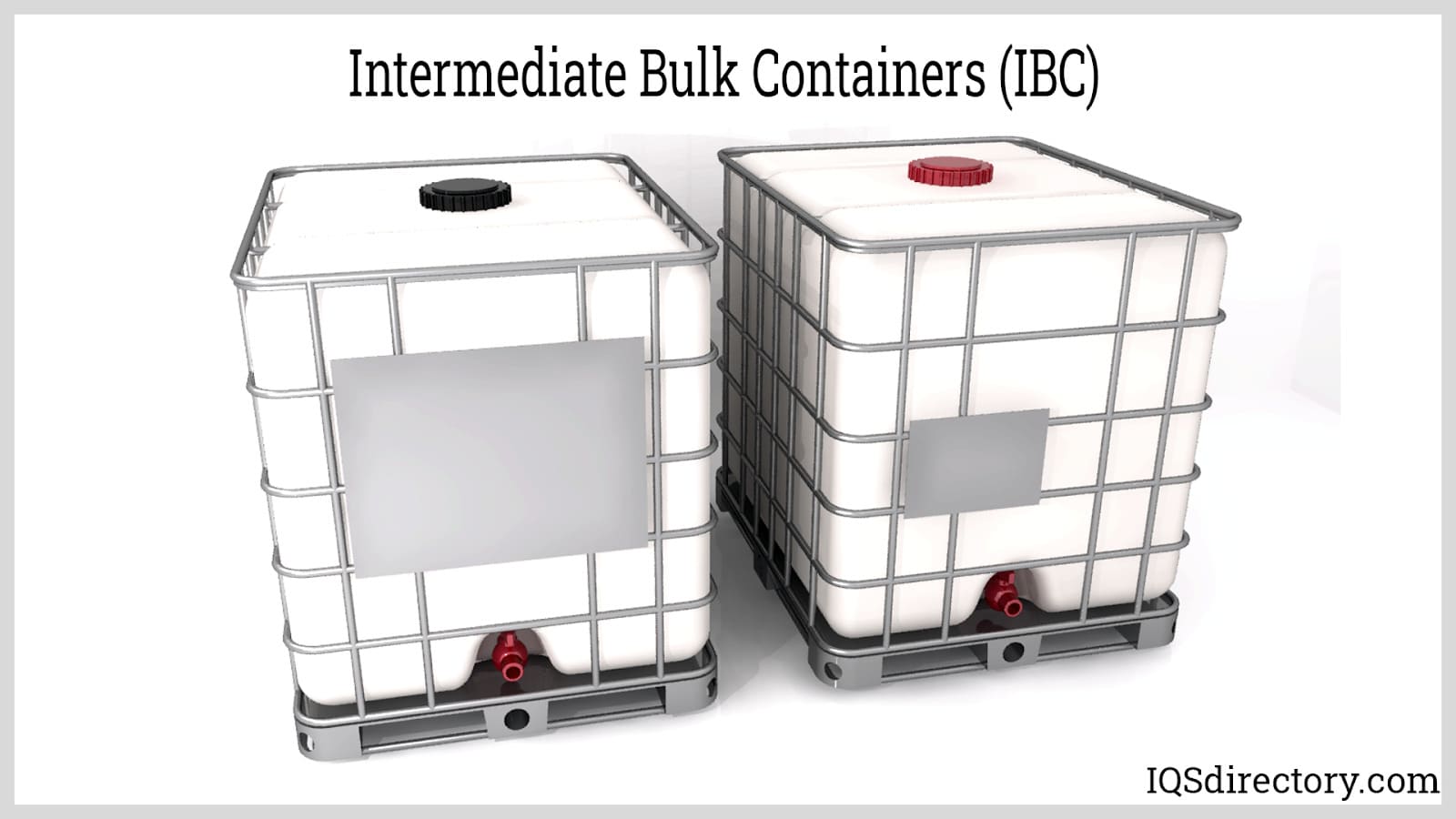The Function of Mass Plastic Containers in Effective Recycling Practices and Sustainability
Bulk plastic containers are essential to modern reusing efforts. Their style boosts the efficiency of product collection and transportation, contributing to sustainability goals. These containers not just enhance room however additionally assist in monitoring contamination levels. Nevertheless, their application is not without challenges. Recognizing the full range of their effect exposes a complex partnership between logistics and environmental responsibility that warrants additional expedition.
Understanding Mass Plastic Containers
Bulk plastic containers act as an essential part in various sectors, assisting in the storage space and transport of products. These containers are commonly made from durable products such as high-density polyethylene (HDPE) or polypropylene, which give sturdiness and resistance to ecological aspects. Their style usually includes features like stackability and modularity, allowing for efficient use of space throughout both storage space and transit.
Industries such as farming, food processing, and producing frequently use bulk plastic containers due to their lightweight nature and ease of handling. The containers can be found in various dimensions and configurations, accommodating the certain requirements of various products. Their convenience expands past mere performance; they can likewise be tailored with lids, deals with, and classifying alternatives to enhance usability - Bulk Plastic Containers. As a result, mass plastic containers play a vital role in maximizing logistics and supply chain procedures throughout several markets, thus adding to overall efficiency and cost-effectiveness
Benefits of Using Bulk Plastic Containers in Recycling
When companies focus on reusing initiatives, the usage of mass plastic containers greatly improves the efficiency of the process. These containers are made to optimize area, allowing for the storage and transportation of bigger amounts of recyclable materials. This leads to fewer journeys to reusing centers, thereby lowering gas usage and linked emissions.
In addition, bulk plastic containers are resistant and long lasting to different ecological elements, making certain that materials stay safeguarded throughout handling and transit. Their light-weight style better adds to reduce transport expenses.
The harmony of these containers helps with better sorting and processing of recyclable products, which can boost general recycling prices. Organizations that adopt bulk plastic containers also demonstrate a dedication to sustainability, positively affecting their brand photo. Inevitably, these advantages not just enhance recycling methods yet also add to broader ecological objectives
Exactly How Mass Plastic Containers Facilitate Product Collection
Effective material collection is substantially enhanced by the use mass plastic containers, as they supply a structured and reliable remedy for collecting recyclable items. These containers are made to fit large quantities of materials, which streamlines the sorting and storage procedure. Their stackable layout takes full advantage of area usage, making it easier for facilities to arrange recyclables without mess.
Furthermore, bulk plastic containers are durable and weather-resistant, enabling exterior placement without destruction. This resilience guarantees that materials stay secured up until they are gathered for handling.

The harmony in size and form of these containers facilitates standardization throughout collection points, enabling better tracking of recyclable quantities. Additionally, their clear nature enables very easy visibility of contents, aiding in the tracking of contamination levels and guaranteeing that just ideal products are accumulated. In general, bulk plastic containers play a critical role in enhancing the product collection procedure, thus advertising reliable reusing practices.
Transportation Effectiveness and Environmental Influence
Transport efficiency plays a necessary role in the recycling process, particularly via the optimization of tons capability wholesale plastic containers. By making best use of the quantity of material transferred, firms can considerably reduce the number of journeys called for, therefore minimizing their carbon footprint. This method not just boosts functional performance but also adds to extra sustainable environmental methods.

Enhancing Tons Capacity
Optimizing lots capability is often forgotten, it plays a necessary function in enhancing transport effectiveness and reducing environmental influence in recycling methods. By taking full advantage of the quantity that bulk plastic containers can hold, reusing operations can decrease the number of trips required for transportation. This not just lowers gas consumption however also lowers the wear and tear on lorries. Effective lots management enables centers to utilize area effectively, making certain that each transportation cycle is as efficient as feasible. Furthermore, well-optimized tons can bring about better settlements with logistics service providers, possibly lowering overall prices. Ultimately, improving lots capacity adds to a more lasting reusing system by cultivating reliable resource usage and minimizing waste created during transport.
Reducing Carbon Impact
As recycling operations venture to decrease their environmental effect, reducing the carbon impact related to transport becomes an essential goal. Mass plastic my site containers play a vital function in attaining this purpose by boosting lots efficiency and optimizing logistics. Their light-weight yet durable design permits optimum freight room application, reducing the number of trips required to deliver materials. By consolidating shipments, recycling centers can decrease fuel intake and greenhouse gas discharges. In addition, tactically locating recycling facilities lessens transport distances, furthermore reducing carbon outcomes. In addition, employing fuel-efficient cars and alternative energy sources improves overall sustainability. By incorporating these practices, the reusing sector can significantly reduce its carbon impact, adding to a much more lasting future.
Challenges in making use of Bulk Plastic Containers

Contamination Concerns
Contamination issues stand for a he has a good point substantial challenge in the effective use of mass plastic containers within recycling techniques. These containers often collect deposits from previous contents, bring about mixed materials that can hinder the reusing procedure. Contaminants such as food waste, chemicals, or non-recyclable materials can endanger the integrity of the entire batch, resulting in raised disposal expenses and reduced recycling prices. Additionally, improper cleansing or sorting can exacerbate these concerns, making it tough for reusing facilities to process materials successfully. The visibility of contaminants not just impacts the quality of recycled items however likewise threatens the total sustainability efforts targeted at lowering plastic waste. Addressing these contamination obstacles is important for improving the efficiency of mass plastic container recycling.
Recycling Infrastructure Limitations
Inadequacy in recycling infrastructure postures significant obstacles for the reliable management of mass plastic containers. Lots of recycling facilities lack the ability to refine huge quantities of these containers successfully, leading to increased delays and costs. Inadequate sorting innovations typically lead to contamination, as bulk containers may be mixed with various other products, making complex the reusing procedure. Limited transportation alternatives additionally prevent the motion of bulk plastic containers to suitable reusing facilities, leading to enhanced landfill waste. Furthermore, a lack of standardized procedures for bulk container recycling develops confusion among customers and organizations, additionally making complex initiatives to promote sustainability. Addressing these infrastructure limitations is important to enhance reusing techniques and optimize the potential of mass plastic containers in a circular economic situation.
Finest Practices for Implementing Bulk Plastic Containers
They must prioritize a calculated strategy that improves effectiveness and minimizes contamination risks when companies consider executing mass plastic containers in their recycling methods. First, choosing the suitable container dimension and type is vital to fit the volume of products being refined. Organizations should additionally establish clear labeling and signs to lead individuals on correct disposal techniques, decreasing complication and mistakes. Normal training sessions for staff can better reinforce these methods, making certain everyone comprehends their functions in maintaining recycling integrity.
In addition, companies ought to implement a regular maintenance routine to check and clean containers, protecting against the accumulation of pollutants. Partnering with regional recycling centers can additionally enhance the collection procedure, ensuring that materials are effectively processed. Ultimately, companies ought to keep track of and assess their recycling metrics, using this information to refine practices in time and advertise continual renovation in helpful site their sustainability efforts.
The Future of Mass Plastic Containers in Sustainable Practices
As companies increasingly prioritize sustainability, the duty of mass plastic containers in recycling methods is readied to advance significantly. Advancements in materials scientific research are bring about the growth of eco-friendly and recyclable choices, enhancing the environmental benefits of bulk plastic containers. Furthermore, the application of closed-loop systems will allow for simpler collection and repurposing of these containers, lowering waste and resource consumption.
Technological improvements, such as clever tracking systems, will make it possible for firms to check the lifecycle of mass containers, enhancing efficiency in reusing processes. As customer need for lasting techniques grows, companies will likely adopt mass plastic containers designed for reuse and lasting worth. Moreover, collaboration between markets and governments will cultivate the facility of standard recycling methods, guaranteeing that bulk containers are effectively integrated into broader sustainability efforts. On the whole, the future of mass plastic containers shows up encouraging, with considerable potential for adding to a circular economic situation.
Frequently Asked Inquiries
Just How Are Mass Plastic Containers Made and What Materials Are Made use of?
Mass plastic containers are normally made from high-density polyethylene (HDPE) or polypropylene (PP) These materials are processed via shot molding or strike molding techniques, causing durable, lightweight containers suitable for various storage and transportation requirements.
Can Mass Plastic Containers Be Recycled Multiple Times Before Recycling?
Yes, bulk plastic containers can be recycled several times before recycling. Their durability and design allow for duplicated usage in numerous applications, advertising sustainability and source effectiveness while reducing the demand for new containers.

What Qualifications Exist for Mass Plastic Containers in Recycling?
Various certifications for bulk plastic containers consist of the Recycling Partnership's certification, the Cradle to Cradle Qualified ™ standard, and the Sustainable Product packaging Coalition's guidelines, making certain containers fulfill certain ecological and recyclability standards for efficient recycling.
Exactly How Do Bulk Plastic Containers Compare to Other Recycling Storage Options?
Bulk plastic containers provide better durability and capacity compared to various other recycling storage space choices, reducing the risk of contamination and promoting efficient transport. Their layout supports much better company, improving general performance in recycling operations.
What Is the Life-span of a Mass Plastic Container in Recycling Processes?
The life expectancy of a bulk plastic container in reusing processes commonly varies from 5 to one decade, relying on use, worldly quality, and ecological conditions, permitting several cycles of use before eventual disposal or recycling.
When organizations focus on recycling efforts, the usage of bulk plastic containers substantially boosts the performance of the procedure. Transportation performance plays a vital duty in the recycling process, particularly via the optimization of lots ability in bulk plastic containers. The use of mass plastic containers in reusing methods encounters substantial obstacles, especially concerning contamination problems and limitations within reusing facilities. Contamination concerns stand for a substantial difficulty in the reliable usage of mass plastic containers within recycling methods. When organizations take into consideration implementing bulk plastic containers in their reusing techniques, they need to prioritize a strategic technique that boosts efficiency and decreases contamination threats.